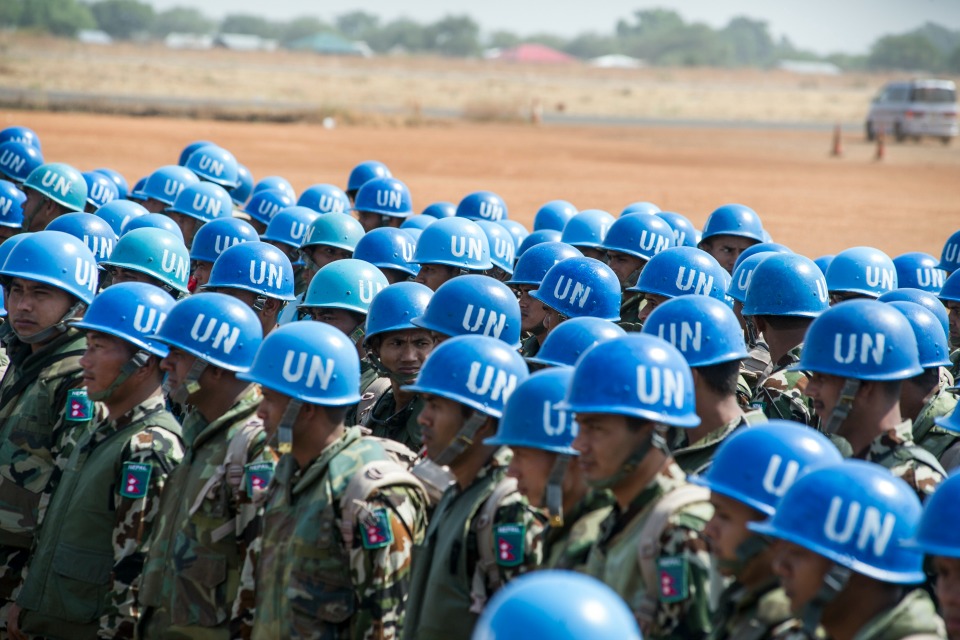"We cannot turn away from those high-threat environments. All too often in fact, they are where the United Nations is most needed."
Statement by Ambassador Matthew Rycroft, UK Permanent Representative to the United Nations, on Asymmetric Threats

Thank you Foreign Minister for convening this important debate. In light of the time, I am shortening my statement.
I express my thanks to the Deputy Secretary-General, and to the other briefers. And I pay tribute to all UN peacekeepers who do such vital work in increasingly difficult circumstances.
Since the United Nations first invented peacekeeping the nature of conflict has changed. And with that change has come a dramatic change to the risks that peacekeepers face. The threats that they now face are more complex and more lethal, ranging from sophisticated spoilers who use terrorist tactics to armed groups pursuing criminal objectives.
The United Kingdom agrees with the High-level Independent Panel on Peace Operations. UN peacekeeping missions are not suited to engage directly in military counter-terrorism operations. But they do operate in environments where asymmetric threats are high. So we cannot turn away from those high-threat environments. All too often in fact, they are where the United Nations is most needed.
The issue at hand is how we operate safely and effectively in these environments; how we get better at understanding and predicting the threats; and how we get better at mitigating those threats.
The High-level Panel concluded that peacekeeping missions lack the specific equipment, intelligence, logistics, capabilities and specialized military preparation required to engage in military counter-terrorism operations. But we do need to ensure that peacekeeping operations have enough capability in each of those areas to operate effectively in high-threat environments, and to do what they can to support wider capacity building efforts in countering violent extremism and terrorism.
The framework that we call the “3Ps” – planning, pledges and performance– was discussed at the London Peacekeeping Defence Ministerial in September, and provides a good framework for addressing these points.
Taking the first “P” first.
In challenging environments strengthened and coherent planning is crucial. The whole UN system needs to come together, so that we have effective horizon scanning and better conflict analysis. With greater use of intelligence, and threat assessments and scenario planning, peacekeeping missions will be better prepared before they deploy and will have systems in place to anticipate and react at the operational and tactical level once peacekeepers are on the ground.
This enhanced planning also needs to take account of parallel forces where they exist. As I have said, UN peacekeeping missions should not themselves be mandated to conduct counter-terrorist operations directly. But they need to be ready to work alongside others more suited to address those threats directly.
Second, on pledges, DPKO is leading work through its Strategic Force Generation and Capabilities Planning Cell and the Peacekeeping Capability Readiness System, which the UK supports, to increase the pool of troops and police ready to deploy. Capability gaps exist and we need to fill them quickly. We also need to get better at matching the experience of Troop Contributing Countries with the areas where they are deployed. The UK has offered our engineering expertise where it is needed in South Sudan and Somalia, and our medical expertise with the forthcoming deployment of a field hospital in South Sudan.
The third “P” is performance. Peacekeepers must arrive properly trained and equipped to carry out their mandated tasks. That means training to a consistent standard and, in the context of this debate, emphasising the force protection aspects of working in high-threat environments. And it should also be clear, right from the start, what is expected of peacekeepers when they deploy to an environment. As a Council, we need to get better at engaging troop- and police-contributing countries. And in return, they need to come ready to share their experience and knowledge.
Finally Mr President, there is perhaps a fourth “P” relevant to today’s debate, as the one that the Deputy Secretary-General reminded us of: Preventing Violent Extremism. No matter how well trained and equipped peacekeepers may be to cope in high-threat environments, their preparations will help deal only with the symptoms of violent extremism. Preventing violent extremism in the first place will help deal with the causes. The United Kingdom strongly supports the Secretary-General’s Plan of Action to Prevent Violent Extremism. We need to consider what more peacekeeping could do to support this agenda, integrating the work of relevant UN bodies, and again remembering the importance of capacity building, working with host governments to tackle extremism and terrorism through security sector reform, judicial reform and strengthened rule of law.
Taken together, all of these elements can help enable peacekeeping to rise to the challenge of dealing with asymmetric threats.
Thank you.